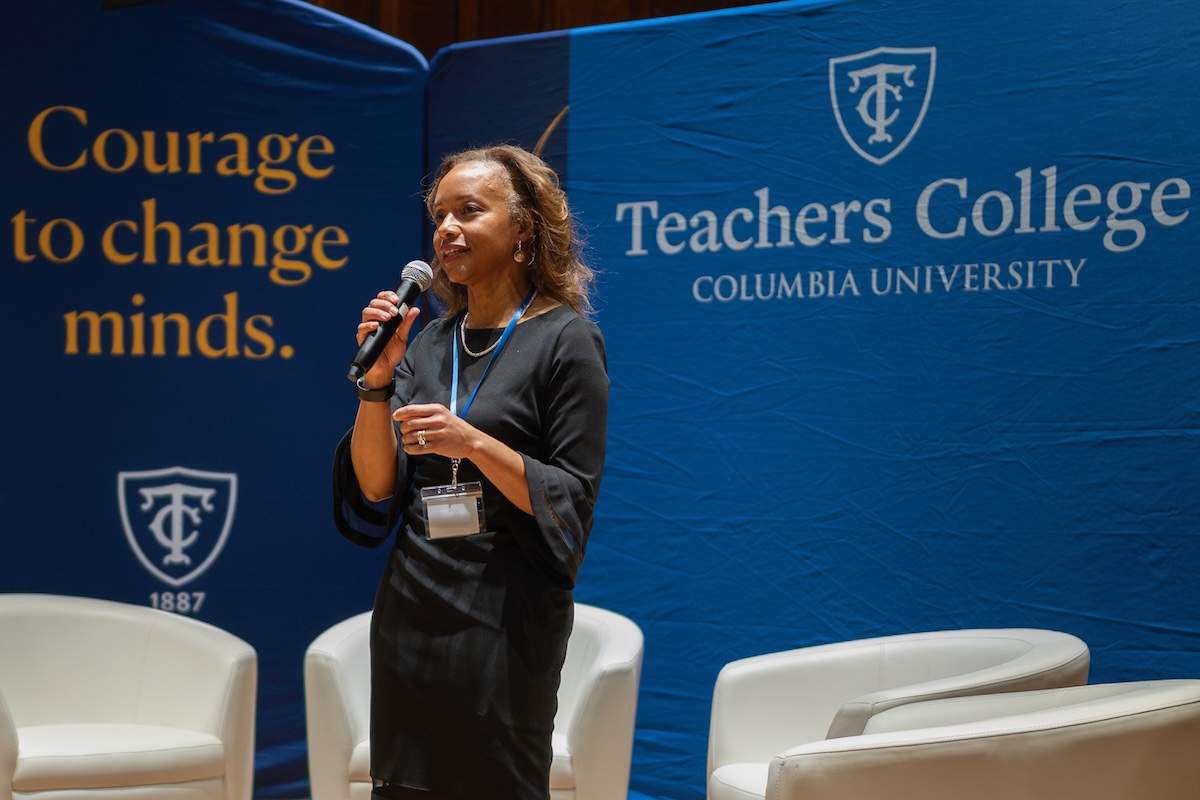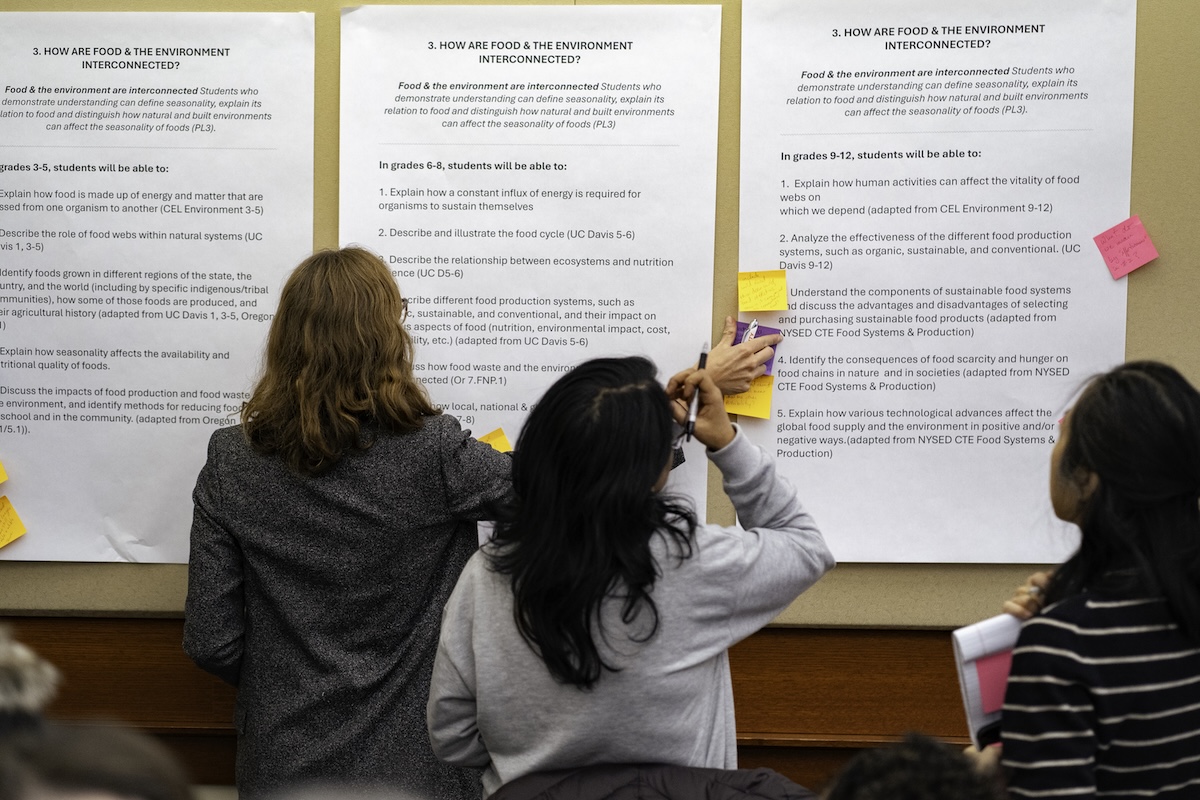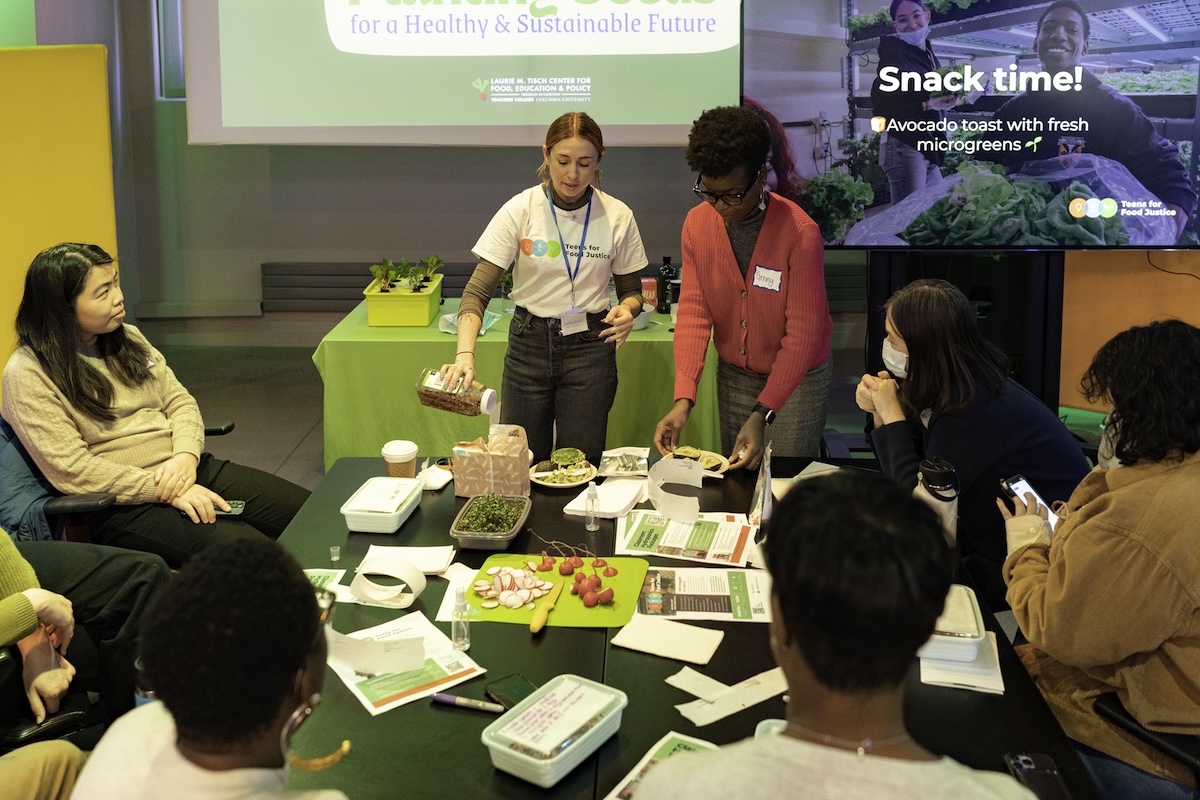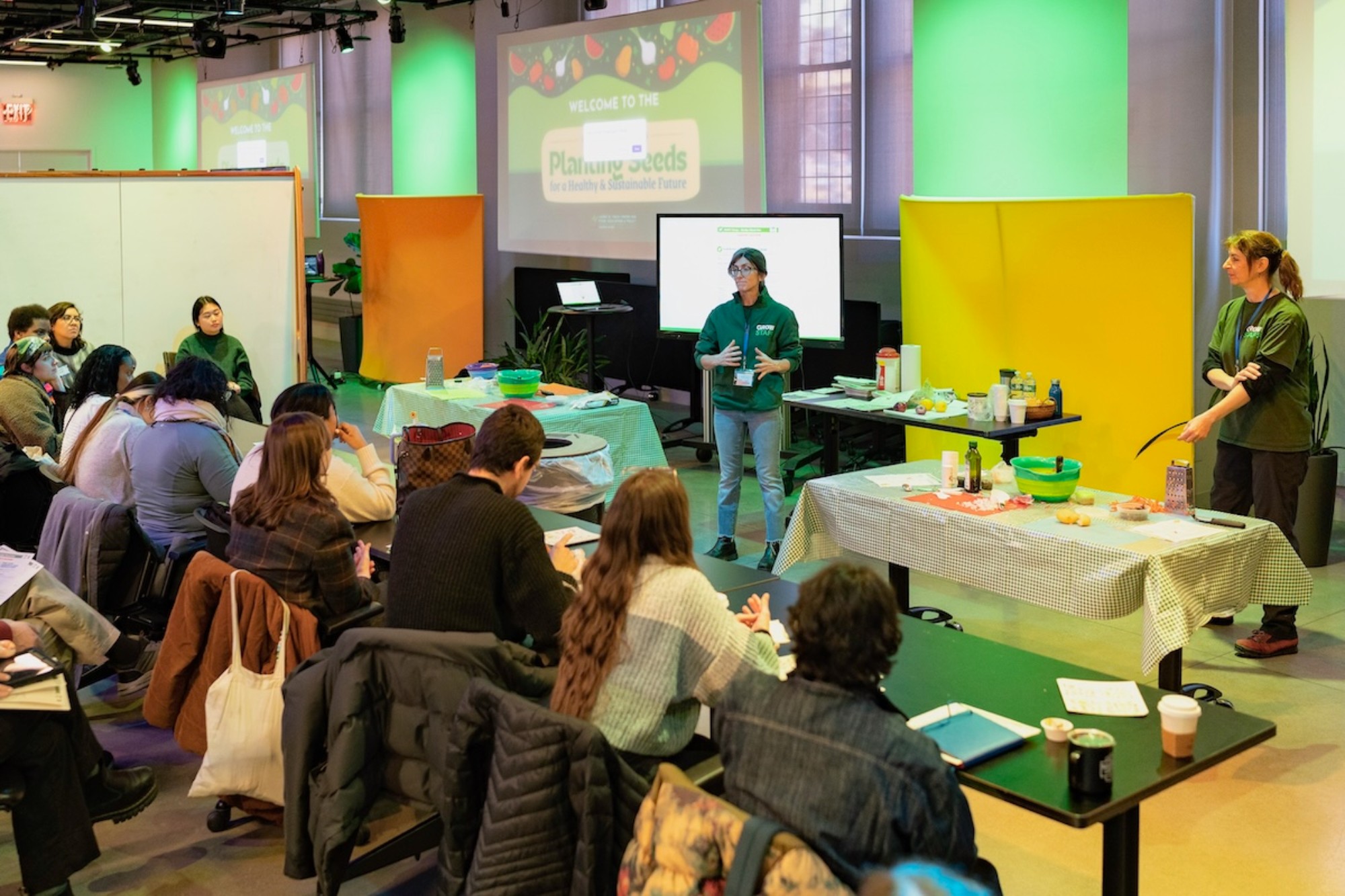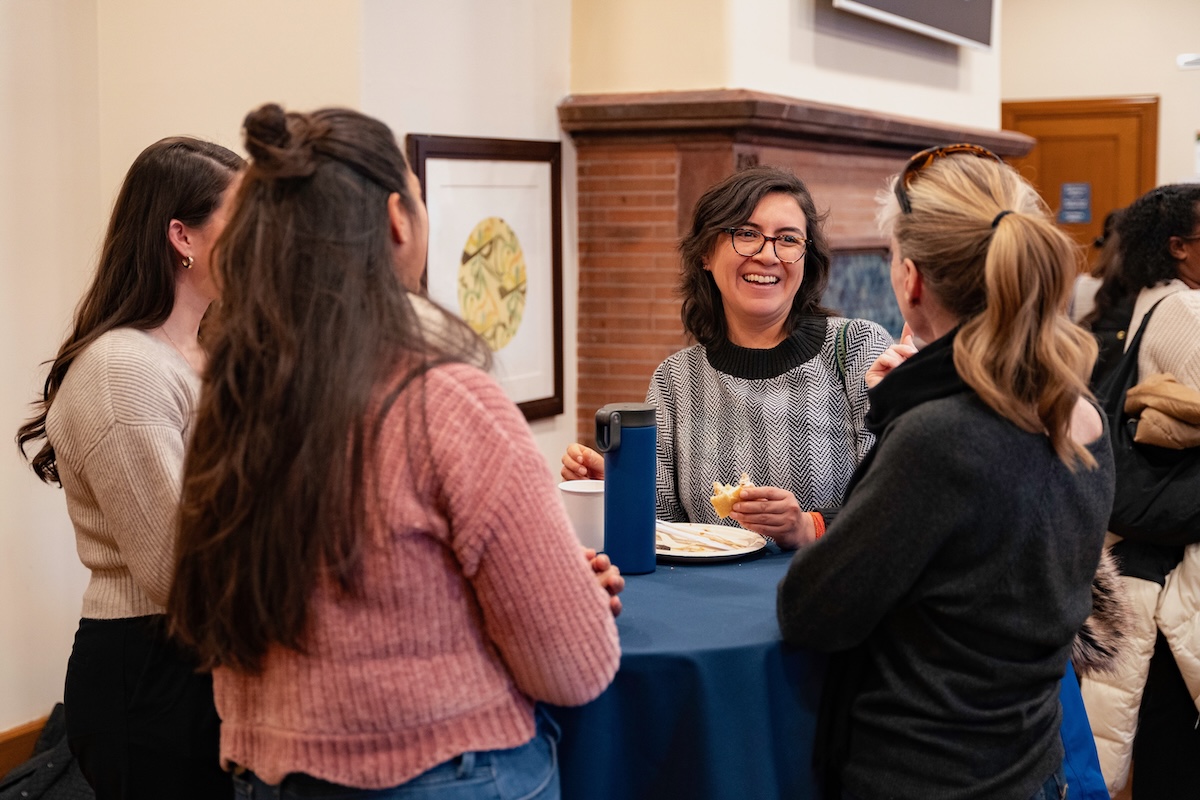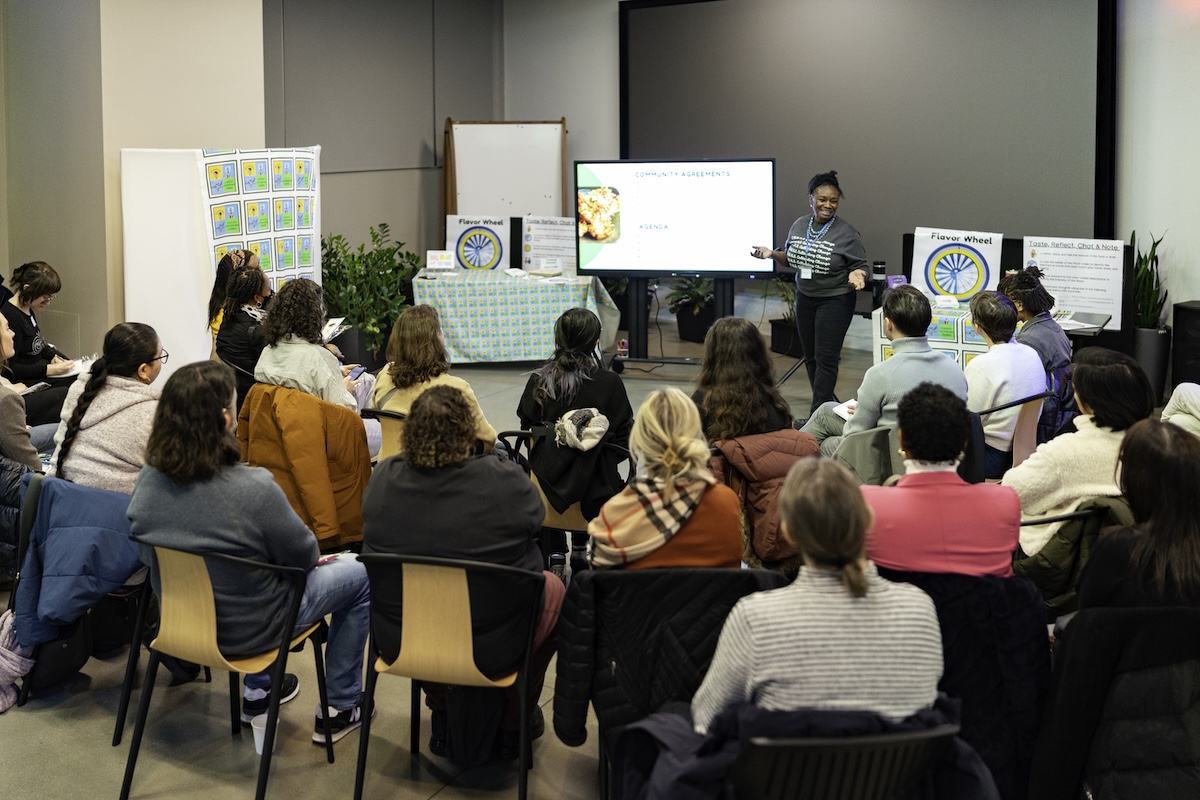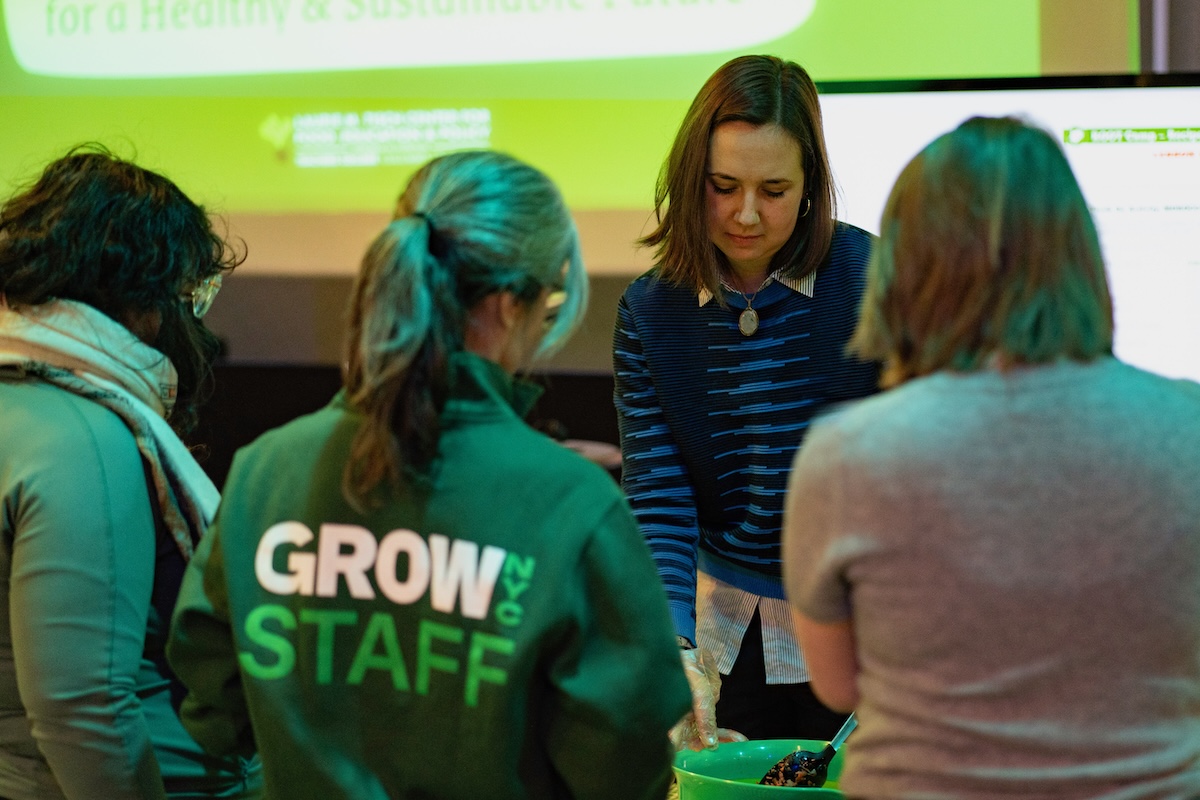At a time when bird flu is decimating flocks of poultry, climate change is negatively impacting harvest yields and the education profession is under threat, evidence-based food and nutrition education is increasingly important. Enter the third annual Food Education Conference, organized by the Laurie M. Tisch Center for Food Education and Policy, which convened educators and policy makers from across New York City for a day of capacity-building through hands-on workshops and presentations from changemakers in the field.
“Climate is so impacted by food, and health is impacted not just by not just personal choice, but the food system itself,” said Jennifer Cadenhead (Ph.D. ’21, M.S. ’18), Executive Director of the Tisch Food Center and Research Assistant Professor in the Program in Nutrition. “It's complicated and being able to communicate it to children or to advocate for policy is increasingly important.”
Titled “Planting Seeds for a Healthy and Sustainable Future,” the conference was designed to improve awareness and confidence around nutrition education in New York City Public Schools (NYCPS). The largest school district in the nation, NYCPS is a leader in providing free, healthy meals to students according to Jeremy Walter, Executive Director of Food and Climate Education at NYCPS.
The gathering was just the latest example of scholarship and practice coming from the Tisch Food Center, which has been working towards a healthy, sustainable and just food system since 2006. The Center supports educators, organizers and policy makers in NYCPS and around the country through interdisciplinary research, advocacy work and by preparing the next generation of leaders in food and nutrition. “Being able to unify the space for food and nutrition education is critical, which is what we’re doing at the Tisch Food Center,” said Pam Koch, Mary Swartz Rose Associate Professor of Nutrition and Education and Faculty Director at the Tisch Food Center, during her welcoming remarks. “It has been exciting to see the support from New York City Public Schools for food education, as well as the City Council’s support of the Food Education Hub here at TC.”
Here are some major takeaways from the conference.
Robust policies make New York City Public Schools a leader in healthy food access
In recent years, NYC policy makers have made large strides toward ensuring equitable access to nutritious meals and improving school wellness. Free lunches, plant-powered meals, plastic-free lunch days and much more are all supported by research-based policies created with the best interests of students, and the planet, in mind. However, access is only part of the equation. “We're providing access that many students don't get in their homes, in school, every day. But now we need to teach them about why it’s important to eat healthy foods,” said Walter, who presented at the conference.
”Students, especially in urban areas, are often disconnected from farm fresh foods. Food and nutrition education can help them understand the importance of eating more vegetables, whole fruits, whole grains and beans on their health,” said Cadenhead, who is also a registered dietitian nutritionist.
Food education not only helps children understand how their food is grown and why nutrition is important, it also leads to higher academic achievement. “Food education can be a catalyst for change,” said NYC Council Member Gale Brewer, a champion for the Food Ed Coalition — a group of more than 600 individuals and organizations convened by the Tisch Food Center — since its earliest days. “It helps students, families, and communities to understand not only where the food comes from, but how it impacts their bodies, their communities, and the planet.” As such, NYCPS launched a number of initiatives ensuring more comprehensive food education such as the Food Education Grant, a program that brings food and nutrition educators into schools to provide services directly to students. The Food Ed Coalition lobbied policy makers for years to implement the program and the Tisch Food Center has been supporting NYCPS in the rollout through school observations as well as providing technical support to educators and organizations on programming and operational best practices.
Currently, NYCPS policy makers are in the process of revamping the 2004 School Wellness Policy and the Tisch Food Center invited the Office of School Wellness to preview the new policy at the conference. Informed by feedback from numerous community organizations, parents, students and policy makers, the refreshed policy will not only clarify best practices around health, nutrition, and physical activity but to make it accessible to those who will be impacted the most, students. “Part of our job as educators, as policy makers, is to make sure we're preparing kids for the world that they are navigating,” said Alice Goodman, Director of Policy Partnerships in the Office of School of Wellness Programs. “That is not only a matter of education, that's a matter of wellness.”
Building capacity for food educators and classroom teachers
To help bridge the distance from education policy to implementation, conference breakout sessions featured interactive workshops and presentations from impactful partner organizations, all of whom are active partners in the Food Ed Coalition. From setting up a small hydroponics system to encouraging respect for food preferences through social emotional learning, each session placed strong emphasis on practical strategies to engage students of all ages, especially teenagers who are more difficult to reach. NYCPS also offered attendees the opportunity to help shape implementation strategies for the updated food and nutrition standards, ensuring that educators weigh in on the policies that will shape their work.
Encouraging curiosity though hands-on food and nutrition education
Enacting the connection between access to green spaces and improved performance in school, several initiatives from NYCPS bring green spaces to the students who need them most, like the city’s Debby Lee Cohen Memorial Annual Sustainability grant which awarded $1 million to more than 200 schools this year. Students who spent more time outside creating a garden learned important lessons about food while having fun, according to Jennifer Cadenhead who observed students at a District 75 school who received funding from the Food Education Grant. "Providing those opportunities to be in touch with real food increases their curiosity as well as their knowledge. It is literally planting seeds for a healthy and sustainable future when you allow children to be involved in these kinds of programs,” said Cadenhead.
When it comes to encouraging students to try new things, “[building] familiarity is so, so important,” said Sierra Hollowell, a Senior Policy Analyst at the Mayor's Office of Food Policy focusing on food education. “Integrating [hands-on education] as much as possible will help students eat those healthier meals, which is ultimately our goal.” Research by Koch showed that students who cooked new school cafeteria menu items with nutrition education provider CookShop were far more likely to eat those meals at lunch. The benefits are felt at home too as increased interest in healthy foods encourages parents to purchase more fruits and vegetables.


